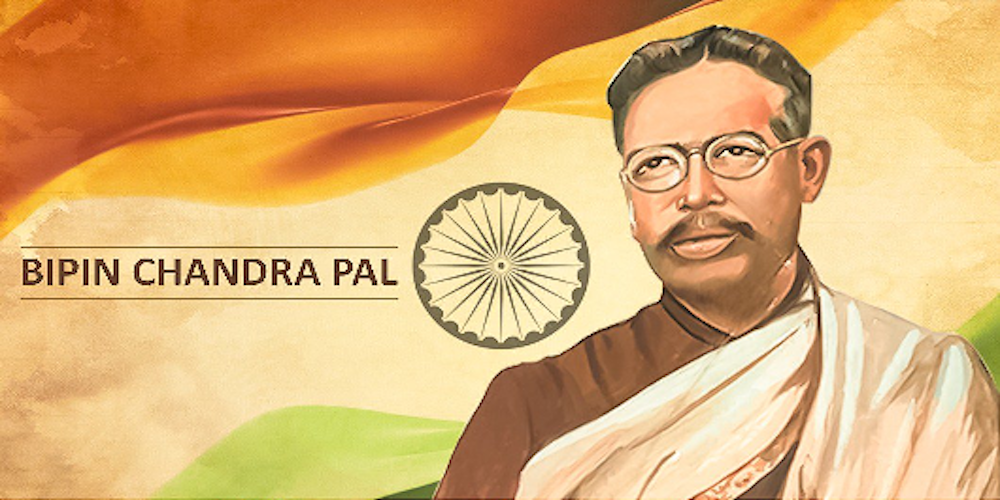Remembering Bipin Chandra Pal

It is time to go beyond Gandhi and remember others’ roles in India’s Freedom Movement
Bipin Chandra Pal whose birthday fell on November 7 would have turned 165 this year. His life and work will continue to inspire us to reflect on the history of India’s freedom struggle against the British colonial rule.
It appears India under the British rule had become impatient and was rightly surging ahead under the leadership of Lal-Bal-Pal along the aggressive Swadeshi path up until the 20’s. The Congress movement then represented the Hindu ethos and culture of Bharat. Any mix of Islamism in the freedom-struggle stream was inadmissible because Islam was universally accepted as a brutal precursor of the British colonial system.
It also seemed apparent that there was a class of vast numbers of educated, enlightened and rational people who genuinely believed that the path of sabotage, violent guerilla tactics, and coercion wouldn’t work for the achievement of independence.
There were, thus, two currents of ideology. Presence of this dichotomy was reflected as far back as in 1907 Surat Session of the Congress Party where Bal Gangadhar Tilak was not even allowed to speak by none other than Pt. Madan Mohan Malviya.
The moderates seemed to have had the advantage because Hindus by their culture were loath to violent and surreptitious activities against their rulers; the supporters of the moderate path could get things delivered to the people by being close to the British ruling circle. Their relatives and friends were holding lucrative-powerful positions in the British Government.
In hindsight, I also probably found the reasons why members of my family, although admirers of Lal-Bal-Pal and later of Subhash Babu, weren’t overly enthusiastic about the path of extremism. They rather liked to side with the moderates because they were mostly zamindars and bar-at-laws and held dominant positions in the social hierarchy.

However, the advent of Gandhi on the scene and introduction of the element of Islamism made things worse! It became quite apparent that the moderates were disguised agents of British rule and rationally believed that violence adopted by the freedom movement wouldn’t be able to defeat the mighty British empire, they would have to remain content with the political concessions — in the form of constitutional rights etc. The supporters of this line of reasoning found an appropriate face-mask in Gandhi.
I have always wondered why members of my Grandfather’s generation in Darbhanga, Bihar were so enthusiastic about inviting Gandhi to Bihar and having a movement (Salt Satyagraha) launched in Motihari. They genuinely believed in staying loyal to the British raj and gaining concessions gradually in non-violent ways. Later, Gandhi appeared to have cleverly used them as the support base to usurp the unquestioned leadership position for himself in the Congress party.
No wonder, the extremists were hounded out. At the Nagpur Congress Party session (1920), Jinnah was also shouted down by the so-called peaceful Gandhians. A rational nationalist and British-educated lawyer who hadn’t turned Islamist until then, Jinnah couldn’t stomach Gandhi’s weird way of pampering the Islamists’. He quit Congress politics in India and went back to England.
The way Gandhi maneuvered his way to introduce Khilafat movement as a part of the mainstream freedom movement (to win over the Muslims) and his subsequent defense of what the Islamists did in the Moplah riots should have been the two compelling or decisive evidence for any common Hindustani freedom-seeker to abandon Gandhi’s leadership at that time.
Despite understanding myself the incongruity of Gandhi’s support to the Khilafat movement and his illogical justification of the Moplah riots, I could still have given Gandhi the benefit of the doubt, but since I see contemporary luminaries like Annie Besant, Aurobindo and a host of others coming out against Gandhi, I wonder why and how the Hindustanis carried the albatross of Gandhi’s leadership for so long.
[Originally from Darbhanga, Bihar (India), Dr Binoy Shanker Prasad lives in Dundas, Ontario (Canada). He is a former UGC teacher fellow at JNU in India and a Fulbright Scholar in the USA. Author of scholarly works including a book, “Violence Against Minorities”, “Gandhi in the Age of Globalization” (a monograph) and a collection of poems”, Dr Prasad has taught at Ryerson University, Centennial College and McMaster University. He has also been the president of Hamilton based India-Canada Society (2006-08 and 2018-20)]



Gandhi did not usurp the leadership of the freedom movement but a vast part of the Indian population saw in him the most potential leader to lead the nation to freedom. He was accepted and revered as a saint revolutionary who could lead them to the goal..By ignoring the sizeable population of Muslims it was not possible to achieve freedom. This was a great feature of the freedom movement that both Hindus and Muslims fought shoulder to shoulder under the unique leadership of Gandhi. It was Gandhi actually who led India to success although contributions of the fire brand revolutionaries cannot be ignored. Their most important role in the weakening of the morale of the Britishthe rulers must also be duly recognised. Gandhi succeeded only because his path was well congruous with the Indian culture and ethos.Had Gandhi not.come.forward, it would have taken a much longer time to achieve freedom and after freedom there would have arisen so many factions with their respective demands on the political system which would have made it incapable of moving democratically. It is undoubtedly Gandhi’s contribution that we are a democracy respectful to various faiths and all kinds of dissent. Gandhi showed the whole world a unique way of dismantling the imperialistic rule and structure. We followed him and therefore we are living peacefully and preaching to the world truth and non-violence which are invincible weapons in.the armoury of human beings. Let us not forget Gandhi. If we want to live happily and peacefully, we will have to go the Gandhi way. Such persons are rare in human history .